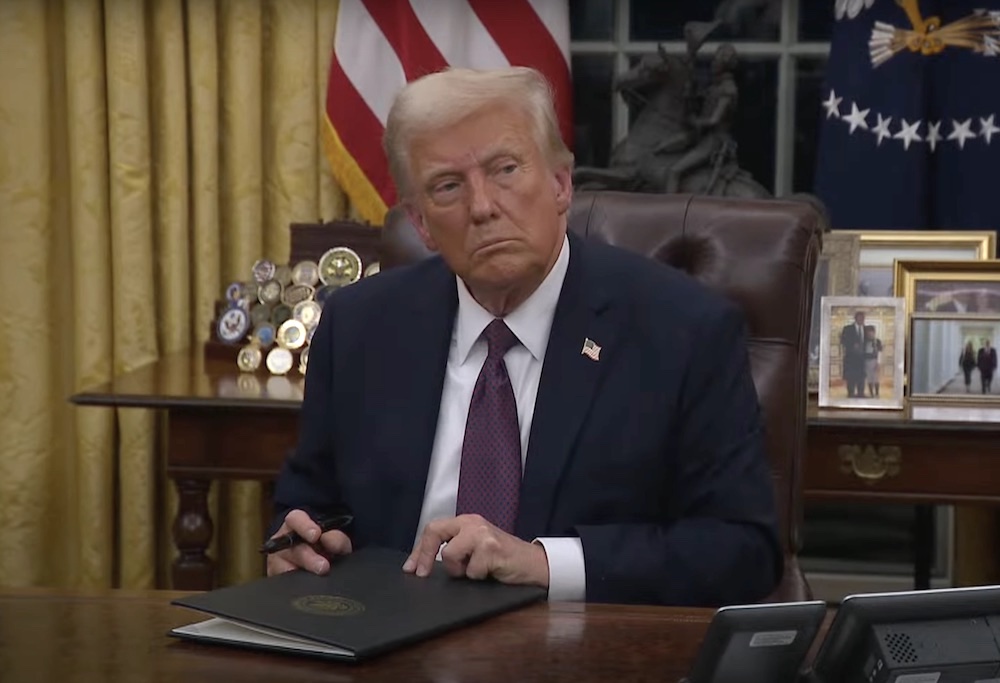
- Details
- By Chez Oxendine
- Energy | Environment
President Donald Trump’s executive order freezing billions in clean energy funding raises questions for tribal renewable energy projects, though experts say its impact appears limited.
Trump’s Jan. 20 order, “Unleashing American Energy,” directed federal agencies to “immediately pause disbursement of funds” from the bipartisan Inflation Reduction Act (IRA) and the Infrastructure Investment and Jobs Act. However, a memo issued the next day by the Office of Management and Budget (OMB) clarified that the pause only applies to programs that conflict with the administration’s energy policies, and agency heads can disburse funds after consulting with the OMB.
The order has raised questions about the Greenhouse Gas Reduction Fund (GGRF), which provides $27 billion for renewable energy development through three programs: the so-called “green banks” — the Clean Communities Investment Accelerator (CCIA) and National Clean Investment Fund (NCIF), which use public funding to attract private investment — and the Solar for All Program. These initiatives target clean energy development across the country, with more than $2 billion allocated to Indian Country.
Former EPA implementation director Zealan Hoover said CCIA and NCIF funding has already been distributed. Green bank program participants, speaking on background, told Tribal Business News they weren’t concerned about funding, but worried about potential IRA changes that could affect their ongoing work.
Solar For All, a $7 billion grant program for solar energy in low-income and marginalized communities, includes multiple Native-serving organizations and states with funds they intend to allocate to tribes. Recipients will receive payments as costs are incurred, Hoover said, regardless of the funding pause, to comply with federal law.
“When an agency signs an award agreement with a recipient, they're entering into a binding legal contract. That contract is governed under federal grant regulations — and those have force of law,” Hoover said. “This is a legal contract (and) the United States has a long and robust history of upholding contract law across the board.”
Despite the federal government’s record on contracts, Trump’s executive action signals his opposition to clean energy funding. His long history of contract disputes, including a mid-2024 breached agreement between his media company and investor ARC Global (thanks, Reuters), suggest potential legal challenges ahead.
The order also creates some unease about direct-pay tax credits issued under the IRA that tribes can use to obtain financing for energy projects. A former Biden administration official, speaking on background, said tax credits remained protected from executive action. While congress could repeal the statute, or the Treasury could change its rule, the president cannot unilaterally suspend the credits directly.
“The initial reading from experts this week — there's not a way to pause the tax credits. They don't see a legal or operational way that it could be done,” the official said. “There is no executive mechanism to turn off a tax credit.”
A policy briefing on Medium by two New York University law professors echoes the sentiment. Law professors Mike Kaercher and David Kamin write that the executive order should not affect IRA tax credits since these credits are not funded through IRA appropriations but through permanent tax code provisions. If the administration attempted to stop or delay these tax credits, they say, such action would face "overwhelming legal barriers" and taxpayers could successfully sue to receive their credits.
Cheri Smith, CEO for renewable nonprofit Alliance for Tribal Clean Energy, said her organization recommends pursuing transferability over direct pay credits.This approach allows tribes to sell their credits to a third party in exchange for cash.
“There hasn’t been any official word on tax credits as of yet,” Smith wrote to Tribal Business News. “We are recommending that tribes consider transferability in lieu of direct pay, as transferability seems to be relatively secure.”
Whatever the case may be, Smith said tribal energy won’t be rolled back without a fight.
“While the new administration may attempt to stop America’s transition to clean energy, the Alliance, our philanthropic partners and especially the tribes we serve stand firm. The pursuit of a regenerative energy future for Tribal communities is not just a passing phase that can be erased with the stroke of a Sharpie marker,” Smith wrote. “The development of clean energy on tribal lands is an exercise of sovereignty that will withstand any turn in government.”
Brian Edwards provided reporting on this story. This story has been updated to include additional information on tax credits from NYU professors writing on Medium.
